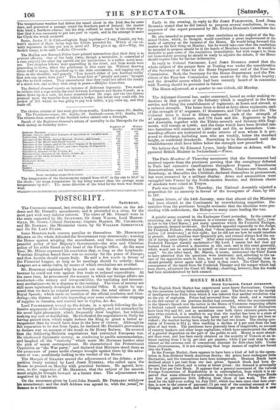POSTSCRIPT.
SATURDAY.
The Commons resumed, last evening, the adjourned debate on the Ad- dress and Mr. Disraeli's amendment; and it proceeded to a close, for the most part with very inferior interest. The views of Mr. Disraeli were in the main supported by Mr. STAFFORD, Sir JOHN WALSH, Lord MANDE- VILLE, Mr. SCOTT, Colonel SIBTHORP, Captain Ilitteis, Mr. COCHRANE, and Mr. RANKES; the Ministerial views, by Sir WILLIAM SOMERVILLE and Sir DE LACY EVANS.
Some Members took courses peculiar to themselves. Mr. MONCKTON MILERS on the whole defended the Government very strenuously; warning the House against adopting the amendment, and thus condemning the peaceful policy of her Majesty's Government—the wise and Christian policy of his noble friend at the head of the Foreign Office. At the same time, Mr. Milnes expressed his conviction that, so long as the Lombardo- Venetian Kingdom lasted there was no security for the peace of Europe; and that Austria should vacate Italy. He said a few words in favour of the Financial League, so long as its meetings should be orderly: these Leagues are a safety-valve, by means of which revolutions are avoided.
Mr. HORSMAN explained why be could not vote for the amendment— because he could not vote against free trade or reduced expenditure. At the same time, he pronounced the manner in which our foreign affairs are conducted—the secrecy and irresponsibility, the vacilating and inconsis- tent mediations—to be a disgrace to the country. The vices of secrecy are still more injuriously developed in the Colonial Office. It might be sup- posed that we have no colonial possessions, from the total silence in the Royal Speech; which made no mention of the official confusion and blun- dering—the distress and ruin impending over some colonies—the stoppage of supplies in Jamaica, and martial law in Ceylon, &c. &c.
Lord PALMERSTON wound up the debate, in a speech following the de- fensive arguments of his colleagues on foreign policy, and not unmarked by his usual light pleasantry, which frequently drew laughter, but without making any new or decided bit. He vindicated the negotiations in Sicily for having gained time, which might induce the King to grant a better ar- rangement than lie would have done in the hour of victory. Although he felt reparation to be due from Spain, he declined Mr. Disraeli's provocation to declare war on account of the insult to Sir Henry Bulwer. He averred that the Schleswig-Holstein negotiations bad prevented European war. He vindicated diplomatic secrecy, as conducing to pacific accommodation; and laughed off the " curiosity " which made Mr. nommen hanker after the pick of secret correspondence. He characterized the Protectionist Opposition as "the War party," and declared that Ministers stood there as the promoters of peace under charges brought against them by the advo- cates of war; confidently looking to the verdict of the House.
The Marquis of Gussenr moved the adjournment of the debate; a pro- poaition firmly resisted by Lord JOHN RUSSELL, who called upon the House to proceed on Monday with practical business. He agreed, how- ever, to the suggestion of Mr. HERRIES, that the subject of the amend- ment mightbe brought forward at a future time. The adjournment was negatived by 221 to 80.
On the assurance given by Lord John Russell, Mr. DISRAELI withdrew his amendment; and the draft Address was agreed to, with the usual: re- ference to a Committee. Early in the evening, in reply to Sir JOHN PAKINGTON, Lord Join; RUSSELL stated that he did intend to propose several resolutions, in con- sequence of the report presented by Mr. Evelyn Denison's Committee last session— He also intended to propose some other resolutions on the subject of the Ses- sional lidera, which, be thought, would constitute a great improvement in the mode of carrying on the business of the House. He would bring forward this matter as the first thing on Monday; but he would take care that the resolutions be intended to propose should be in the hands of Members tomorrow. It would be desirable to pass some of the resolutions immediately, but with respect to those not immediately pressing he should be ready to adjourn the debate, if the House should require time for further deliberation.
In reply to Colonel SIBTHORP, Lord Join; RUSSELL stated that the whole subject of the pauper farm at Tooting was under the consideration of the Secretary of State fbr the Home Department and of the Poor-law Commission. Both the Secretary for the Home Department and the Pre- sident of the Poor-law Commission were anxious for the fullest inquiry; and the dreadful scenes which had been recently heard of in connexion with Tooting should be prevented in future.
The House adjourned, at a quarter to one o'clock, till Monday.


























 Previous page
Previous page